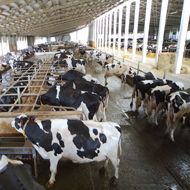Livestock contributes to 4.2 per cent of emissions

'One certainly cannot neglect emissions from the livestock sector but to compare them to the main emission sources would put us on a wrong path to solutions.'
Livestock is responsible for just 4.2 per cent of all greenhouse gas (GHG) emissions in the US, a professor from UC Davis has written in a white paper.
By comparison, the transport sectors contribute 27 per cent, while energy production is to blame for 31 per cent, according to figures from the US Environmental Protection Agency (EPA).
Professor Frank Mitloehner cited the figures to dispel the myth that livestock contributions are comparable to those of the transport sector - a claim he says is often made by anti-animal agriculture advocates who believe the solution is limiting meat consumption by introducing 'meatless Mondays'.
But Prof Mitloehner says that putting the figures into perspective, if all US Americans practiced meatless Mondays, national GHG emissions would fall by just 0.6 per cent.
'One certainly cannot neglect emissions from the livestock sector but to compare them to the main emission sources would put us on a wrong path to solutions, namely to significantly reduce our anthropogenic carbon footprint to reduce climate change,' he wrote.
Furthermore, the US livestock industry has made considerable progress in the past six decades, seeing a 79 per cent increase in milk production since 1950, despite a 59 per cent drop in the number of dairy cows.
However, due to differences in efficiency, it takes two or more cows in Mexico and nine cows in India to produce the same amount of milk as one cow in the US, which increases methane and manure production.
Tackling the 2050 challenge of supplying food to a dramatically growing population can be achieved by intensifying livestock production, which provides opportunities for the mitigation of climate change, Prof Mitloehner added.
Read the full white paper here: http://www.afia.org/rc_files/801/livestocks_contribution_to_climate_change_facts_and_fiction.pdf



 The Veterinary Medicines Directorate (VMD) is inviting applications from veterinary students to attend a one-week extramural studies (EMS) placement in July 2026.
The Veterinary Medicines Directorate (VMD) is inviting applications from veterinary students to attend a one-week extramural studies (EMS) placement in July 2026.